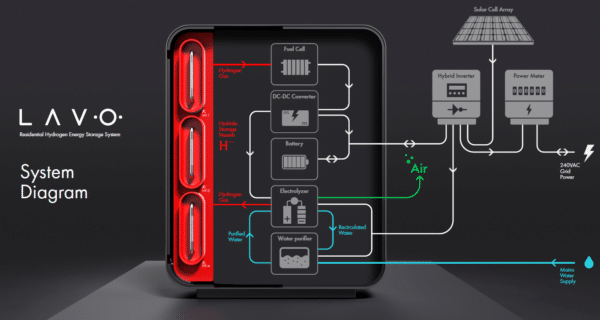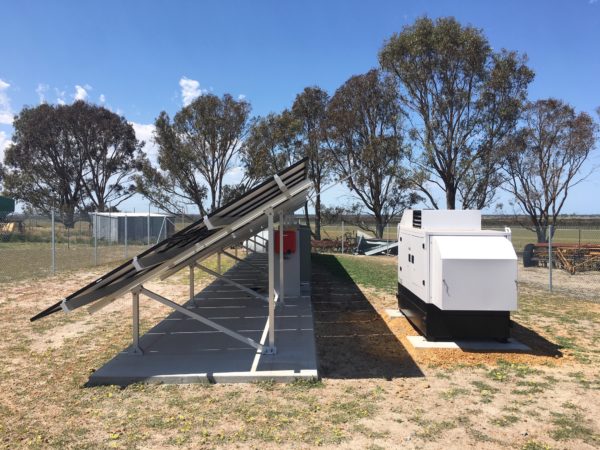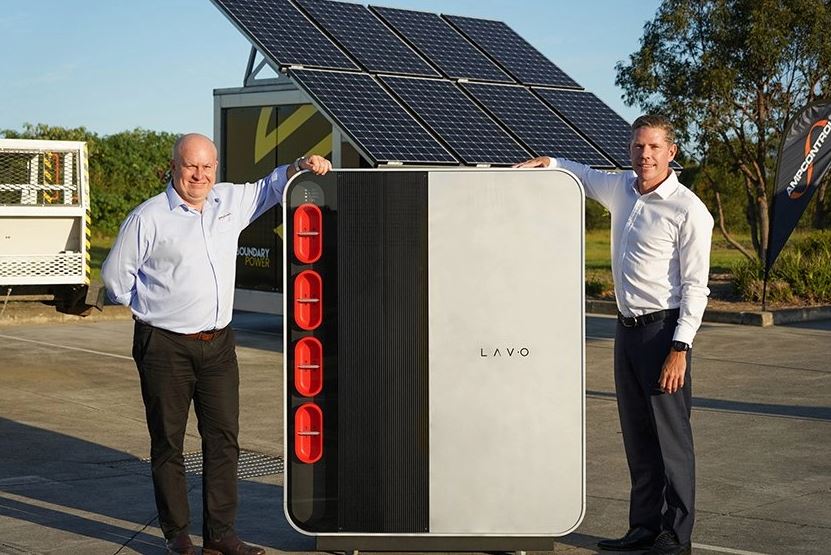Western Australian standalone power system (SPS) specialist Boundary Power has announced a strategic partnership and collaboration agreement with Sydney-based hydrogen energy storage system specialist LAVO and integrated electrical solutions provider Ampcontrol which is expected to deliver a range of solutions for regional and remote power users.
SPS – self-sufficient power systems combining solar PV and battery technology, generally backed up by a diesel generator – have emerged as an increasingly cost-effective and efficient option for grid operators searching for more reliable alternatives to the traditional poles and wires in remote areas.
The partnership agreement between the three companies is expected to deliver a range of innovative solutions for customers in isolated areas, along with data centres and other energy intensive industries.
It will also see the parties work together over the next two years to identify the use of LAVO’s hydrogen storage solutions and other zero-carbon products in different demonstration sites.
LAVO chief executive Alan Yu said potential applications for the technology include standalone hybrid power supplies, containerised solutions for small and utility scale wind and solar projects and packaged power and battery solutions for data centres, industrial and mining applications.
“Lavo’s hydrogen storage technology is ideally suited for integration with remote standalone power systems and for other containerised and mobile power solutions,” Yu said.
“We’re thrilled to be working with Ampcontrol and Boundary Power to explore the options for wider use of our products.”

Image: LAVO
Developed in partnership with the University of New South Wales’ Hydrogen Energy Research Centre, LAVO’s hydrogen energy storage system uses patented metal hybrid technology to store hydrogen equivalent to up to 60 kWh which will produce 40 kWh of useable electricity.
At installation, the energy storage system is connected to a solar PV array via a hybrid inverter, and to water via a purification system, to enable internal electrolysers to convert excess energy into hydrogen, which it stores in four canisters.
When stored energy is needed, the LAVO activates a fuel cell to deliver electricity to the residence or business. An integrated 5 kWh lithium battery provides a buffer that can provide instantaneous response to power shortage or outage.
Ampcontrol CEO and Boundary Power director Rod Henderson said LAVO’s energy storage system appears ideally suited to off-grid applications and the partnership would allow it to further explore its potential.
“Ampcontrol has a long history in the development of innovative products and Boundary Power possesses industry leading experience in utility-grade stand-alone power solutions,” he said.
“Our partnership with LAVO is the continuation of our commitment to finding the best solutions to the energy challenges facing remote areas and energy intensive industries.”

Image: Horizon Power
Western Australia has become a hot spot for SPS technology with the state government earlier this year announcing a $17 million package to roll out another 98 units across regional WA in 2021 as part of a $218 million commitment to manufacture and install more than 1,000 SPS over the next four years.
Boundary Power, a joint venture between Ampcontrol and Western Australian state-owned energy utility Horizon Power, is among the companies tapped to develop and install the off-grid systems.
Perth-based manufacturer Hybrid Systems Australia, a subsidiary of QIC-owned Pacific Energy, is also involved in the SPS roll out and has also been exploring the potential of the LAVO system.
Hybrid Systems executive director Michael Hall told pv magazine the hydrogen technology has the potential to not only produce cost savings but also value add to the SPS units, suggesting it could initially be used in place of the diesel generator as a back-up energy source.
“We’ve done some early scoping studies on the LAVO looked at integrating it into our standalone power systems,” he said.
“We’ve also looked at the possibility of adding that value train to our SPS instead of, or as additional energy towards the battery.”
This content is protected by copyright and may not be reused. If you want to cooperate with us and would like to reuse some of our content, please contact: editors@pv-magazine.com.









2 comments
By submitting this form you agree to pv magazine using your data for the purposes of publishing your comment.
Your personal data will only be disclosed or otherwise transmitted to third parties for the purposes of spam filtering or if this is necessary for technical maintenance of the website. Any other transfer to third parties will not take place unless this is justified on the basis of applicable data protection regulations or if pv magazine is legally obliged to do so.
You may revoke this consent at any time with effect for the future, in which case your personal data will be deleted immediately. Otherwise, your data will be deleted if pv magazine has processed your request or the purpose of data storage is fulfilled.
Further information on data privacy can be found in our Data Protection Policy.